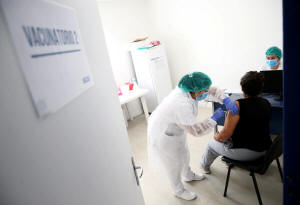'Alarm bells': Brazil's COVID-19 chaos sparks fear, countermeasures from
neighbors
 Send a link to a friend
Send a link to a friend
 [March 25, 2021]
By Fabian Werner, Agustin Geist and Daniela Desantis [March 25, 2021]
By Fabian Werner, Agustin Geist and Daniela Desantis
MONTEVIDEO/BUENOS AIRES/ASUNCION (Reuters)
- When the Copa America basketball tournament got underway last month in
the midst of a pandemic, the hosts in Cali, Colombia took no chances.
Players and staff from participating men's national teams from around
Latin America lived in a local "bubble" without contact with outsiders;
all were tested regularly for COVID-19.
Missing from the contest was Brazil. The country has been so ravaged by
coronavirus, including a new and highly contagious home-grown variant
known as P1, that Colombia would not permit the Brazilians to land on
their soil.
A double header of soccer World Cup qualifiers was also called off this
month after Colombia's health minister said he would not allow a charter
flight of Brazilian footballers to land in Colombia for the game.
Sports are just the beginning. Brazil's neighbors and trading partners
are taking steps to limit contact with South America's largest country -
and contemplating more draconian ones. The fear is that the progress
many nations in the region have made against COVID-19 could be reversed
by new waves of infection from Brazil, whose out-of-control pandemic is
incubating virulent new strains that are worrying medical experts
worldwide.

"It is a very alarming situation and a regional threat," said Leda Guzzi,
an infectious disease expert and member of the Argentina Society of
Infectious Diseases.
Even crisis-torn Venezuela has plenty to say. On Sunday, Venezuelan
President Nicolás Maduro called Brazil "the world's worst threat in
terms of the coronavirus" and chastised its leader, Jair Bolsonaro, for
his "irresponsible attitude."
Bolsonaro, who contracted COVID-19 last year and wears a mask only
sporadically, has repeatedly downplayed the crisis, even as his country
has tallied more than 12 million confirmed COVID-19 infections and
nearly 300,000 fatalities, trailing only the United States. He has
opposed lockdowns and touted unproven treatments such as the
antimalarial drug hydroxychloroquine.
Bolsonaro's office did not respond to a request for comment. The
president repeatedly has defended his government's handling of the
pandemic.
In landlocked Paraguay, where COVID-19 cases are hitting record highs,
the government on March 16 discouraged people from non-essential travel,
citing Brazil's "high number of infections and record deaths from
COVID-19."
Chile's government in early March ordered that all visitors from Brazil
be taken to state-run quarantine hotels to do a COVID-19 PCR test, and
be kept there if they tested positive. Those rules were toughened last
week to impose a mandatory 72-hour stay in a transit hotel even with a
negative test.
In Bolivia's department of Beni, a state-like area that shares a long
land border with Brazil, COVID-19 cases are exploding in the cities of
Riberalta and Guayaramerín, according to Ernesto Moisés, Beni's
Secretary of Human Development.
Many Bolivians in this northern region live off trade and interaction
with Brazil. Moisés is calling for border closures to help save lives.
"I think that now is a time for authorities to forget about politics and
everything, we have to be tough because you can't do politics if
everyone is dead," he said.
DRASTIC RESTRICTIONS
Fueling Brazil's deadly outbreak is a more contagious variant of the
novel coronavirus, known as P1, which emerged in its northern Amazon
region near the end of 2020 and now predominates in much of the country.
Early studies suggest it can overcome some antibodies and increase a
person's chances of reinfection.
The Pan American Health Organization (PAHO), the regional arm of the
World Health Organization, said on Tuesday that the P1 variant had been
detected in 15 countries in the Americas and was a major cause for
concern.
In Argentina, which has been reluctant to close borders with Brazil, its
top trading partner, calls for tougher rules are growing louder from
scientists and regional leaders.
In a video meeting on Monday between the interior minister, health
officials and regional governors, participants discussed potential
measures including strengthening border security forces, with a focus on
areas near Brazil, Paraguay and Bolivia, a government source familiar
with the proceedings said.
[to top of second column]
|

Brazilian Elisabete Tunes Arpino, 65, who lives in the Brazilian
city Santana do Livramento receives a dose of the Sinovac's
CoronaVac coronavirus disease (COVID-19) vaccine, at the Comeri
hospital in Rivera, Uruguay March 19, 2021. Picture taken March 19,
2021. REUTERS/Diego Vara

Also under discussion is the possibility of speeding up vaccinations
for border personnel, tightening rules for truckers carrying cargo
across borders, and cracking down on travelers, including
Argentines, coming from Brazil.
"Work is being done to strongly restrict entry from Brazil with
drastic restrictions on the frequency of flights from the
neighboring country," said a government source on Tuesday, who said
restrictive measures would be defined in coming days.
Guzzi, the Argentine infectious disease expert, is among the health
experts calling for border closures, restrictions on people coming
from Brazil or mandatory confinement periods.
"What happens to Brazil has a very important impact on what happens
in our national territory," she told Reuters. "If this (P1) variant
takes hold in Argentina it can be very dangerous."
In Uruguay, a popular holiday spot for Brazilians, hospitals in
towns and cities near the border with Brazil are reaching saturation
level and running out of beds.
Once Latin America's best performer at containing the virus, Uruguay
is now seeing cases soar. The country's average daily per capita
rate of infection, at around 50 cases per 100,000, now exceeds that
of Brazil, at 35 per 100,000, according to data on confirmed cases.
In Montevideo, health authorities last week launched a working group
of specialists to analyze test samples to help track the entry of
new variants, including P1. Uruguayan authorities confirmed they had
detected the P1 and P2 Brazilian variants for the first time on
Monday.
"The alarm bells are ringing", said Julio Pontet, president of the
Uruguayan Society of Intensive Care Medicine. He said that the rise
in COVID-19 cases in Uruguay's north-east region bordering Brazil
were much worse than elsewhere.
'RED MARCH'
Brazil, meanwhile, is on track for its worst month in the pandemic
with already more than 40,000 deaths in what some local papers have
branded "red March." Intensive care units in some cities are
overwhelmed and have shortages of medicines.
Bolsonaro, who has declined the coronavirus vaccine, opposes
business closures and social distancing measures. A number of state
governors, who tightened restrictions last year, have done so again
in recent weeks despite the president's protests. Brazilian
businesses have also started to demand firmer action, with some like
carmaker Volkswagen AG halting operations.
Many countries, however, remain reluctant to completely seal
themselves off from Brazil, Latin America's top economy.
And PAHO, while concerned about Brazil's impact on the region,
suggested full border closures were not the answer.
Jarbas Barbosa, PAHO Assistant Director, told Reuters that strong
public health measures such as mask wearing, physical distancing,
better surveillance and lockdowns when necessary remained the best
hope for stopping the spread.

In Paraguay, though, local authorities say their country is at risk
as long as neighboring Brazil remains a vector for coronavirus.
"We always say that when Brazil sneezes, Paraguay gets a cold," said
Guillermo Sequera, director of health surveillance at the country's
Health Ministry.
(Reporting by Fabian Werner in Montevideo, Agustin Geist in Buenos
Aires, Daniela Desantis in Asuncion, Daniel Ramos in La Paz;
additional reporting by Julia Symmes Cobb in Bogota, Marco Aquino in
Lima, Pedro Fonseca in Rio de Janeiro, Anthony Boadle in Brasilia,
Marta Lopez in Buenos Aires, Aislinn Laing in Santiago and Luc Cohen
in Caracas; writing by Adam Jourdan; editing by Adam Jourdan and
Marla Dickerson)
[© 2021 Thomson Reuters. All rights
reserved.] Copyright 2021 Reuters. All rights reserved. This material may not be published,
broadcast, rewritten or redistributed.
Thompson Reuters is solely responsible for this content. |